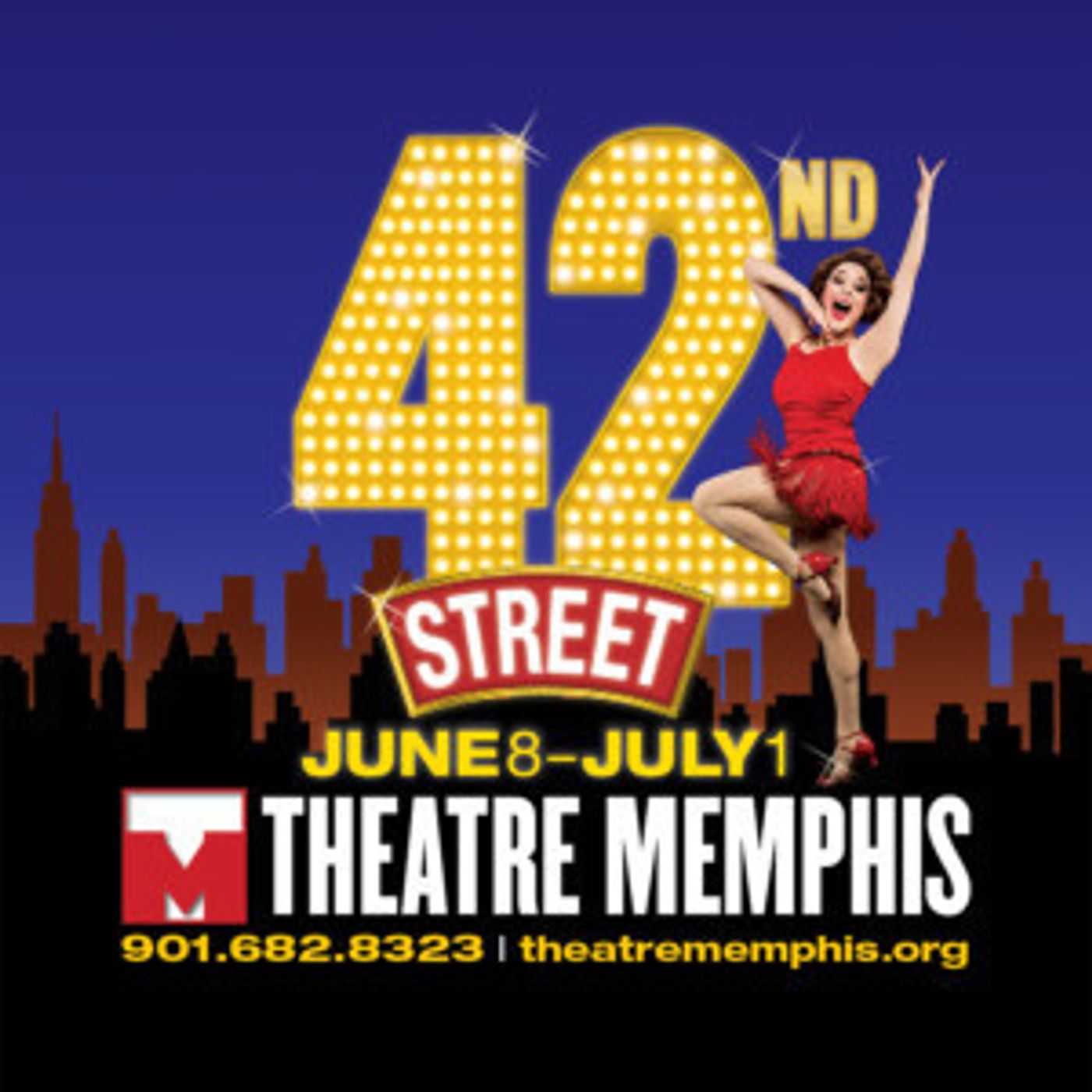Review: 42ND STREET at Theatre Memphis
 As the overture concludes, the curtain rises, but only halfway - just enough for the audience to catch a glimpse of the finely choreographed, tapping lower limbs of the chorus, which form the heart and soul of Theatre Memphis's rousing, season-closing production of 42nd Street. Indeed, as the show's titular musical number proclaims, the audience need only hear the beat of those dancing feet to know what 42nd Street is all about. With crowd-pleasing chorus numbers, recognizable tunes, and a plot centered on a group of budding performers with that indomitable "let's put on a show" spirit, there is perhaps no more quintessential a representation of classical American musical theater than 42nd Street. The show so evokes its 1930s setting that it seems remarkable it did not first hit the Broadway stage until 1980.
As the overture concludes, the curtain rises, but only halfway - just enough for the audience to catch a glimpse of the finely choreographed, tapping lower limbs of the chorus, which form the heart and soul of Theatre Memphis's rousing, season-closing production of 42nd Street. Indeed, as the show's titular musical number proclaims, the audience need only hear the beat of those dancing feet to know what 42nd Street is all about. With crowd-pleasing chorus numbers, recognizable tunes, and a plot centered on a group of budding performers with that indomitable "let's put on a show" spirit, there is perhaps no more quintessential a representation of classical American musical theater than 42nd Street. The show so evokes its 1930s setting that it seems remarkable it did not first hit the Broadway stage until 1980.
Directed by Ann Marie Hall, Theatre Memphis's outstanding production of 42nd Street serves up nostalgia in droves. The story revolves around the efforts of director Julian Marsh (Lee Gilliland) to launch a new Depression era stage show called Pretty Lady featuring a chorus line of talented aspiring starlets. The youthful exuberance of the Pretty Lady ensemble stands in stark contrast to the show's embittered star, the long past her prime Dorothy Brock (Caroline Simpson), who exudes as much delusional self-confidence as she does a lack of self-awareness as to her capabilities as a performer. Enter the young Peggy Sawyer (Gia Welch), a killer tap dancer and bundle of positive energy fresh off the train from Allentown, Pennsylvania, who charms her way into the Pretty Lady chorus and later, Julian's heart. There are hiccups and subplots along the way, but it is not too much of a spoiler to reveal that the show and its characters arrive at a satisfying conclusion. This is a musical comedy after all.
The production is anchored by strong performances across the board by its principal and featured actors. As Julian, Mr. Gilliland shows the command of a seasoned performer, charismatically maintaining his character's eminent likeability, even when he is tough on his young cast of upstarts. Much as his character recognizes that the Pretty Lady chorus is critical to the show's success, Mr. Gilliland restrainedly allows his fellow 42nd Street cast members to shine. That is not to say he does not seize the moment on "Lullaby of Broadway," a true highlight.
As rivals of sorts, Dorothy and Peggy, Mss. Simpson and Welch solidly execute their characters' core competencies, singing and dancing respectively. Ms. Simpson's soprano soars beautifully, particularly on the "Shadow Waltz" (a number comically enhanced by the skilled lighting design of Jeremy Allen Fisher). Although it would have been nice to see more nuance in Dorothy's somewhat "one note" character (as well as her eventual change of heart about Peggy), that is certainly more of an issue with the book than any individual performer. The lack of character development allows Dorothy's "I Know Now" to be somewhat eclipsed by the other characters' mocking reprise that immediately follows it. Ms. Welch's Peggy does not miss a beat (or a dance step). Her smile and moxie light up the stage, daring the audience not to root for her every step of the way.
Other standouts in the cast include Mary Buchignani, who hits all the right comedic notes as Pretty Lady writer (and den mother to the chorus), Maggie Jones. Jason McCloud delivers all the necessary schmaltz as the production's featured song and dance man, Billy Lawlor. As Peggy's core "girl squad" in the Pretty Lady cast, Lindsey Roberts, Cameron Crawford and Ashley Cunningham delight with their talent (and wigs), making the show better every time they are on stage. Their "Go Into Your Dance" is another production highlight.
On the technical side, there were isolated moments during the reviewed performance when performers seemed to be battling with the orchestra (e.g., on "Dames"), perhaps an issue with the sound mix. Notwithstanding, the production is finely executed. Those looking for a dazzling "42nd Street" in lights will not be disappointed.
Ultimately, the stars of 42nd Street are truly its ensemble. Armed with Christi Hall's wonderful choreography, the chorus executes the series of memorable numbers one expects from a production of 42nd Street. They exude a uniquely authentic sense of camaraderie and team spirit, and that is a credit not only to them, but also to the entire Theatre Memphis production team.
42nd Street features music and lyrics by Harry Warren and Al Dubin respectively, and a book by Michael Stewart and Mark Bramble. It runs through July 1 at Theatre Memphis, 630 Perkins Extended, Memphis, Tennessee 38117.
Reader Reviews

Videos

